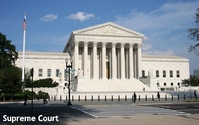 Aereo's streaming video service marks the “next technological step” in television technology, the startup says in papers filed Wednesday night with the Supreme Court.
Aereo's streaming video service marks the “next technological step” in television technology, the startup says in papers filed Wednesday night with the Supreme Court.
The company
says that its system merely enables consumers to watch over-the-air television and make personal copies of the programs -- activity that's already legal under “core principles” of the law.
The Supreme Court will hear arguments in the case on April 22.
“The evolution of technology from a black-and-white television connected to a rabbit-ear antenna and
a Betamax to a high-definition television connected to a digital antenna and DVR has not changed those core principles,” Aereo says in its court papers. “This case simply concerns the next
technological step: allowing a consumer to access broadcast programming using an Internet-connected device coupled with a remotely located, individually assigned antenna and segregated video
storage.”
advertisement
advertisement
Aereo allows people to watch over-the-air television on iPhones, Androids and other devices. The company also allows people to record shows for later viewing.
TV
broadcasters are suing the company for allegedly infringing copyright by transmitting programs without a license. But Aereo says it's legal, due to its design, which relies on antennas to capture
programs and then stream them to users. The Supreme Court recently agreed to decide whether Aereo's streams infringe copyright
The broadcasters contend that the streams, when considered in
aggregate, constitute public performances, which require licenses. They argue in
papers filed with the Supreme Court that Aereo's “simultaneous retransmission of 'live TV' to paying strangers is no more private than the live retransmissions of cable and satellite
companies.”
Aereo argues that the streams are private, because they're made on an antenna-to-user basis. The company adds that the broadcasters' arguments about aggregation threatens the
cloud computing industry with “potentially ruinous” consequences.
The company argues that any cyberlocker service that streamed the same song or movie to two people at once
would be engaging in a public performance, according to the broadcasters' logic. “On petitioners’ view, whenever two users of a cloud-based 'virtual locker' service -- such as Google Drive
-- separately play a song stored on the provider’s servers, the provider is publicly performing by transmitting the same 'underlying' performance to multiple members of the public,” Aereo
argues.
The case has drawn much interest, along with friend-of-the-court briefs from a variety of groups, including the National Association of Broadcasters, several sports leagues and Center
for Democracy & Technology.
The Obama administration recently weighed in against Aereo, arguing that its transmissions are public performances. At the same time, the government also says
that cloud services -- which allow people to access music, movies or other media on a variety of devices -- don't infringe copyright.
Aereo launched in New York in 2012 before rolling out to
other major markets in much of the country. Broadcasters sued in federal courts in New York, Boston and Utah, with varying degrees of success. Judges in New York and Boston sided with Aereo, but a
judge in Utah ordered the company to stop operating in six Western states.